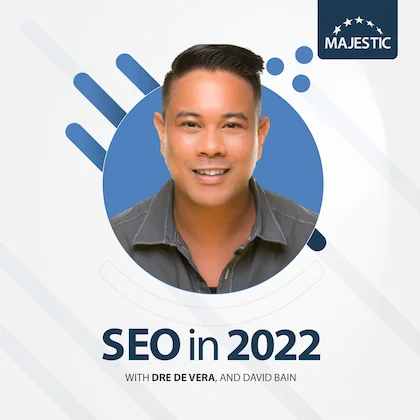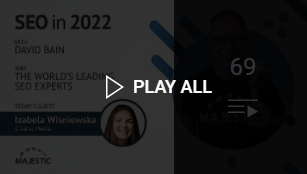-
Site Explorer
- Majestic
- Summary
- Ref Domains
- Backlinks
 New
New Lost
Lost- Context
- Anchor Text
- Pages
- Topics
- Link Graph
- Related Sites
- Advanced Tools
- Author ExplorerBeta
- Summary
- Similar Profiles
- Profile Backlinks
- Attributions
- Compare
-
Link Tools
- My Majestic
- Recent Activity
- Reports
- Campaigns
- Verified Domains
- OpenApps
- API Keys
- Keywords
- Keyword Generator
- Keyword Checker
- Search Explorer
- Link Tools
- Bulk Backlinks
- Neighbourhood Checker
- Submit URLs
- Experimental
- Index Merger
- Link Profile Fight
- Mutual Links
- Solo Links
- PDF Report
- Typo Domain
- Free SEO Tools
-
Support
- Blog

- Support
- Get started
- Tools
- Subscriptions & Billing
- FAQs
- Glossary
- How To Videos
- API Reference Guide

- Contact Us
- About Backlinks and SEO
- SEO in 2024
- Link Building Guides
- Webinars
- Blog
Create semantic content using the Google SERPs
Dre de Vera
Paul follows on from Omi's tip by sharing that you can use the Google SERP to design your semantic content strategy.

Create semantic content using the Google SERPs
Paul Andre de Vera says: "Create semantic content, it's really easy. You can just use Google SERPs to figure it out."
How do you find the SERP that is right for you, and what do you do when you find it?
"SEOs are too caught up on ranking for just one term. Semantic content is all about ranking for intents and multiple terms or queries. You can get more, better quality traffic than just ranking for just one term. Why rank for one term, when you can rank for hundreds?
Take your head term, the one that you really want to rank for, and put it into search. On the SERP you'll see People Also Ask questions - use those as your subheadings, and as questions or answers. Then, scroll to the bottom and you'll see some related keywords, which you want to sprinkle in as well. To make it more semantically related, and have more density, click on one of the related keywords and go to the next page. You'll see another set of keywords at the bottom of that SERP. You can do this at least three times.
SEOs get caught up on page one, but page two and page three are like emerging topics and trends. This is how to find key semantic terms and create semantic content. To be more current, change your Google settings to 'searches within the past year'. That way, you'll be catering to what's trending right now, and what people are actually searching."
Should you add these relevant keywords to your existing page, or create new pages?
"You shouldn't need to create new pages. I'm in the B2B space, in enterprise SEO. I think about this when I'm creating SEO briefs for writers. When I'm asked how we can rank for a certain term, I'm not thinking about that term on its own. I'm thinking about the terms, intents, and queries that would come up using the strategy I just mentioned.
Keep it simple. There are four places to hit first: the meta title, the URL, the H1, and within the first 100 words. From there, write naturally, answer the People Always Ask questions, and keep including those keywords. I've seen a lot of my content that's been done this way rank for 1000s of keywords. That includes different queries and long-tail phrases. Having hundreds of relevant terms on the first page is a better way of showing value than just showing up for one keyword.
This method is also less competitive, you're more likely to retain your rankings over the long-term and build authority for your broad subject."
How do you justify the value of seeking out phrases that may have lower search volume?
"Search volume is a good indicator, but not a hard source of truth. People are always searching for new things. You can look at this within your Google Search Console and see how many times these things show up in the impressions.
On Google, if you use 'within the past year' or 'within the past month' and these keywords are showing up, it shows that people are searching it. They may not be appearing on some tools because they are new. Using these settings will let you see the keywords that are actually being searched for right now."
What type of business is this strategy most appropriate for?
"I've seen it work most effectively for bigger brands. If you have brand recognition, it's going to work really well - it definitely suits for enterprise companies. At enterprise companies you can use great writers, link out to your sources, and design a really semantically-created page. Semantic content works best when it is well written, annotated, and resourced."
How long does it take before you can measure success?
"It will be at least three weeks after you start publishing before you start seeing anything publicly. I used this strategy to target the term 'financial management system'. It's a fairly well-used term that we're now on the first page for. There are thousands of other keywords on that page that are ranking as well. When going for those big terms it can take longer. It depends on your brand recognition, and the amount of data you already have on your website. If you are known in your niche it will really help."
Is this strategy best for standard blog articles on your website, or is it effective for other content as well, like YouTube titles?
"This is a strategy I'm testing on YouTube right now, and I think it's going to be effective on a lot of different platforms. It almost feels like I'm spilling secrets. Try it. I'm trying it and I'm getting good results. It will give you a head start against competitors that aren't using it yet. It works because the same person that searches something on Google, is also searching on YouTube. People use similar search terms on multiple platforms. The title of a video, for example, is very important. Doing that research beforehand, and incorporating the phrases that people are looking for, is a big opportunity. If you're going to use this strategy on YouTube, make sure you say your keywords in the video as well."
How does this strategy fit in with other tactics and tasks that SEOs are doing?
"I am doing this all the time. For every campaign that comes out, you will have as SEO portion. You may be doing content syndication and a paid search campaign attached to it, for a whole omni-channel approach. Organic search work should be a part of this. Whether you have campaigns quarterly or yearly, it's something that you should be doing for all of them."
How do you convince corporate to support this strategy without high search volume data?
"I've had to do this before, and I used the results to prove its value. I had to convince corporate to give me a budget, so I could get some content created, and come back to them with the results.
Once you've got your content written in the right way, you can prove the value by showing which keywords are ranking. Throw those into a tool and see what the cost per click is for them. Take the value of the keywords and multiply that by the actual visits from organic clicks. This gives a value of how much the page has saved you in contrast to using paid search. That's a metric I always share with leadership - the value of all the keywords that a page is ranking for, added up monthly. That's how much you're saving from paid search."
What type of content should you be creating with these keywords, is it necessary to have images or videos?
"You should add images for sure, though videos tend to slow down the page. You can have certain sections of your website where you put your videos.
You also need to identify what the SERP is looking for. You might think you need a minimum of 1500 words but look at the SERP to gauge it before you start writing. Observe the SERPs, and even competitors as well. Dig through the top 10 pages, see what the average word count is and use that as your guide. You can always tweak it afterwards. Let it be concise for the user to begin with, then see what you can do after you've completed some reports.
I only really use SEO tools for research, search volume, and maybe seeing backlinks. If you want to get ranking, the answers are right in front of you on the SERPs. You can also see the featured snippets, copy what's working, and then make it a little bit better. You might be able to steal that as well."
What should an SEO stop doing to spend more time looking at SERPs and creating semantic content?
"Stop trying to find a shortcut. Don't get hung up on putting blog comments or forum comments all over the place - the sorts of things that used to work back in the day. It may work if it's targeted in a certain niche, but it doesn't have broad value, especially if it's going all over the place. If you want to get great links, use tools, and find the links that your competitors have. Look for places where you can capture and have your links used instead.
With the emphasis on social media, blog comments have become much less important, even if the signals of social may not be a direct ranking factor. Whether it's Twitter, Tumblr, or other Web 2.0 properties, I love to include social in my SEO strategies. For some companies I've developed their own Medium page to get some equity from there. Social provides a great mixture of benefits over seeking a shortcut through blogs."
You can find Paul Andre De Vera at Dre.me.
Choose Your Own Learning Style
 Video
Video
If you like to get up-close with your favourite SEO experts, these one-to-one interviews might just be for you.
Watch all of our episodes, FREE, on our dedicated SEO in 2022 playlist.
 Podcast
Podcast
Maybe you are more of a listener than a watcher, or prefer to learn while you commute.
SEO in 2022 is available now via all the usual podcast platforms
Don't miss out
Opt-in to receive email updates.
It's the fastest way to find out more about SEO in 2025.
Could we improve this page for you? Please tell us





